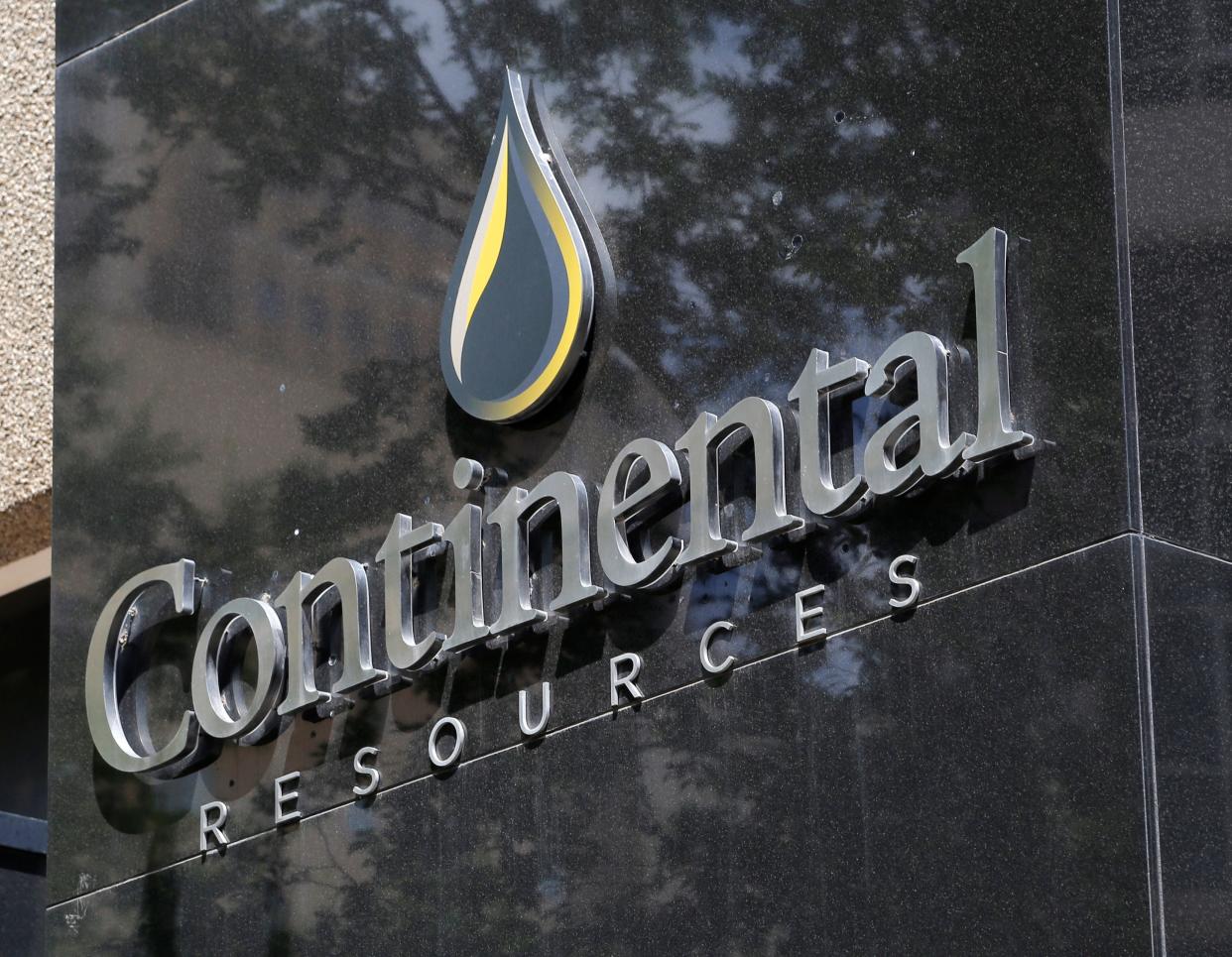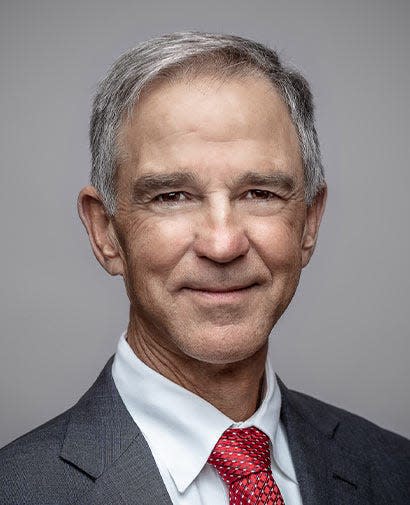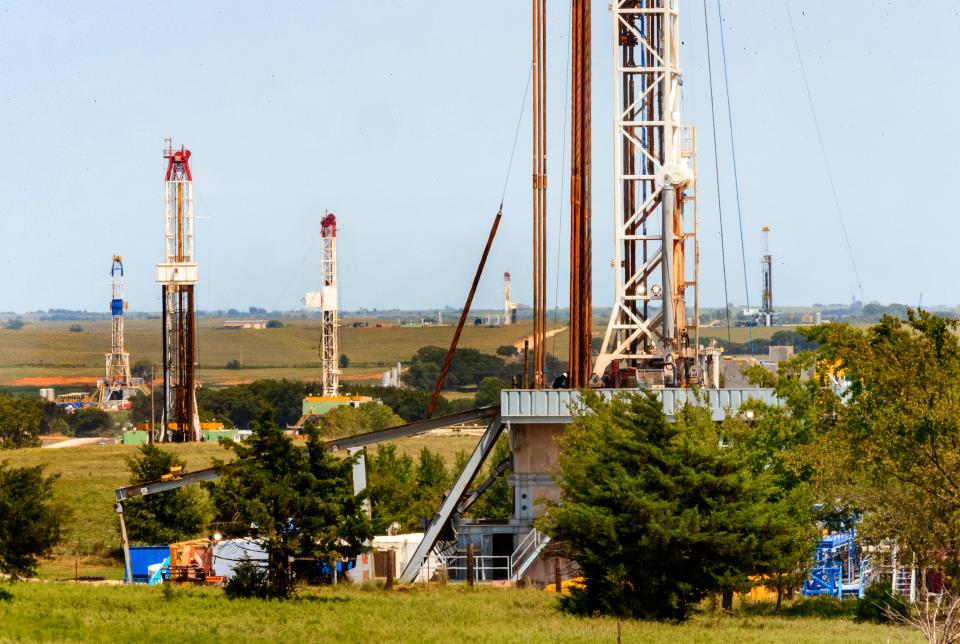Harold Hamm plans to take Continental Resources private. What that means for the company

- Oops!Something went wrong.Please try again later.
Continental Resources founder Harold Hamm and his family are prepared to spend about $4.4 billion — in cash — to acquire all of the company's outstanding shares in a move to take the company private.
The Hamms, which already collectively own 299.7 million shares of the company's stock (83%), are offering to acquire nearly all of its remaining 62.9 million shares for $70 each.
If its board, which Hamm chairs, ultimately accepts the offer, shareholders would get 9% more than what a share was worth at the close of trading Monday. Even so, some analysts said Tuesday they believed Hamm's offer undervalues the company.
The only shares not included in the acquisition plan are those underlying unvested equity awards issued under the company's long-term employee incentive plans. Employees holding those shares would be compensated through a comparable incentives program created by the private company, company officials said.
Read more: Second defendant accused of front-running Continental Resources' plans faces charges
Hamm, Continental Resources' founder, sent the company's board of directors a letter Monday to make the proposal on behalf of "a newly formed entity" created by his family.
"Our Proposal to acquire each outstanding share of common stock (other than excluded stock) delivers certain and significant value and liquidity to Continental's shareholders," Hamm wrote.
Hamm stated the entity formed by his family seeks to merge itself with the public company "without a vote of Continental shareholders," once a deal has been made between the Hamms and the company to acquire its outstanding shares.
The offer is not dependent upon any financing-related conditions, Hamm's letter states.
Hamm's plan scrutinized by analysts, investors
Some analysts and investors in Continental Resources were not enthused by Hamm's plan, according to one post on SeekingAlpha, a website where various contributors write about subjects related to publicly traded companies on the stock market and investment strategy.
Truist analyst Neil Dingmann, who has a $95 price target and a buy rating on the company's stock, stated in a note on the SeekingAlpha post he thought the move could attract a competitive counter-offer within that range.
RBC analyst Scott Hanold wrote in a note on the same post he, too, believed it likely would take a higher price to get a deal done, especially in light of current elevated commodity prices.
The second-largest shareholder after Hamm reportedly felt the company stock was worth closer to $100 a share, according to SeekingAlpha.
But Jake Dollarhide, CEO of Longbow Asset Management in Tulsa, told The Oklahoman he didn't seem too concerned about those potential headwinds Tuesday because Hamm controls well more than half of the company's stock.
"When you only need 51% of support from shareholders and you own 83% of those shares, it doesn't really matter."
Besides, Dollarhide said trying to come up with a truly accurate valuation of an energy production company in wildly gyrating post COVID-19 commodity markets is about as challenging "as winning a game of Whack-a-Mole."
"When it comes to Continental Resources, we are talking about a company that had a stock price of around $7 a share when the pandemic started and a $12 stock when oil prices went negative in April, 2020. Look at where it is today."
Plus, he said he wouldn't at all be surprised if the company, once private, decides to reopen itself to investors through an Initial Public Offering within about three years.
"That's the playbook other companies have been following," Dollarhide said.
Hamm details reasons for plan in letter
Hamm told employees in the Tuesday letter he believes taking the company private would be "incredibly beneficial" to both them and the organization.
"As you know, Continental started in 1967 and operated as a private company with a great deal of success for the next 40 years. In 2007, to help further capitalize the development of the Bakken, we made the decision to enter the public market. At that time, the public market rewarded companies for both growth and performance."

Hamm told them he believes those advantages have eroded, however, particularly since the onset of COVID-19.
He wrote that while nearly 50 energy and production companies were publicly traded in 2017, the number today has fallen to about half of that because of mergers, failures and because public companies took themselves private.
"This diminishing number of public entities is illustrative of a lack of support from the public market, and we believe there is a resulting under-appreciation of Continental."
He also told employees their total compensation would be "substantially equivalent" to what they currently earn, that employees with unvested stock awards would be adequately compensated, and that the private company would continue to offer employees an annual bonus program just as it has in past years.
Read more: Robert Hefner V refutes Continental Resources, fights to get civil suit against him tossed
"I know that we will all continue to stay focused on doing our work safely, efficiently and effectively with our unwavering commitment to producing energy responsibly," Hamm wrote. "Our decision to make this offer is based on our belief in the future of this company and its people."
CEO writes separate letter to employees
William B. Berry, Continental's CEO, also wrote a letter to employees to let them know they should continue to conduct "business as usual" routines.

While he said there is no assurance that any transaction will be approved and executed, he reassured employees the company is staying in Oklahoma City and that no "reductions in force," or layoffs, are anticipated to be needed as part of the plans.
"Only one of two things is going to happen. Either Continental will stay public, with approximately 83% ownership by the family, or Continental will be 100% owned by the family," he wrote.
What happens next
In a filing made with regulators, Hamm stated his family expects that Continental Resources' board of directors will establish a special committee composed of "disinterested and independent" members to work with independent legal and financial advisers to evaluate their offer.
He made it clear that the special committee would be given the authority to reject the proposal in the best interests of the company as it launches its work.

"We want to advise you (the company) that we are interested only in acquiring Continental's common stock and are not interested in selling" any the family already owns, he wrote.
If the deal ultimately is rejected, Hamm said his family intends to remain long-term shareholders in the company.
Business Writer Jack Money covers Oklahoma’s energy and agricultural beats for the newspaper and Oklahoman.com. Contact him at jmoney@oklahoman.com. Please support his work and that of other Oklahoman journalists by subscribing to The Oklahoman.
This article originally appeared on Oklahoman: What we know: Continental Resources could become a private company

